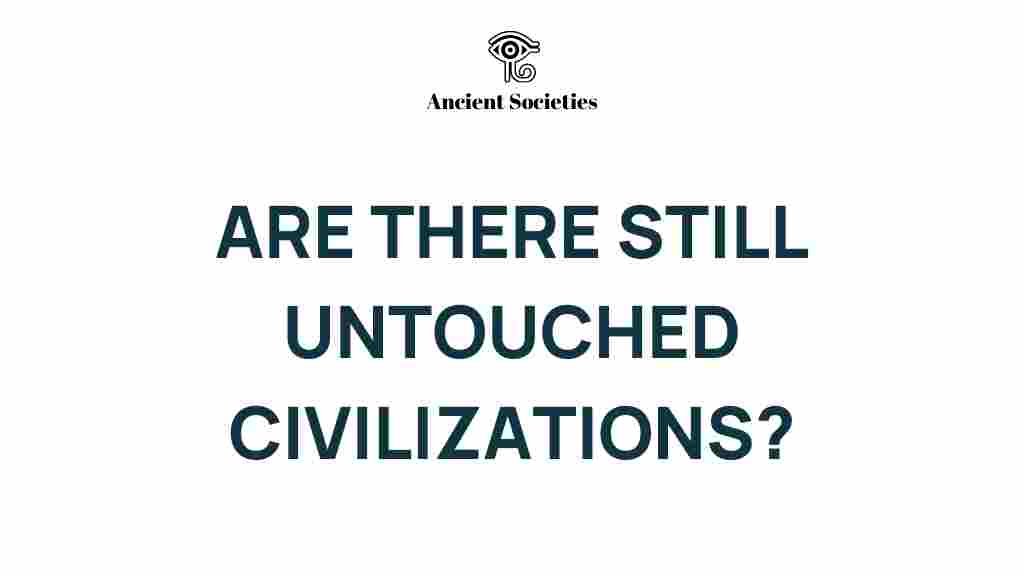Untouched Civilizations: Are They Still Hidden in Our World?
The concept of untouched civilizations has long fascinated explorers, anthropologists, and the general public alike. Throughout history, tales of lost cultures and remote tribes have sparked imaginations and encouraged the pursuit of knowledge about indigenous peoples who thrive outside the influence of modern society. Despite the ever-encroaching reach of globalization, there remain places on Earth where hidden societies exist, largely undetected by the outside world. In this article, we will delve into the intriguing world of untouched civilizations, exploring their significance, the ongoing efforts to discover them, and the challenges they face.
The Allure of Untouched Civilizations
Untouched civilizations represent a direct link to humanity’s past. These lost cultures have managed to maintain their unique ways of life, often surviving in remote locations that are difficult to access. The appeal of these societies lies in their potential to offer insights into human history, evolution, and cultural diversity. They embody the resilience of indigenous peoples and showcase the importance of cultural preservation.
- Exploration: The quest to find untouched civilizations fuels exploration, encouraging adventurers to traverse uncharted territories.
- Anthropology: Studying these cultures provides valuable data about human behavior, social structures, and adaptation.
- Cultural Preservation: Understanding lost cultures can inform efforts to protect endangered societies from external threats.
The Locations of Untouched Civilizations
Many untouched civilizations are hidden in remote and inhospitable regions, including:
- The Amazon Rainforest: Known for its incredible biodiversity, the Amazon is home to numerous isolated tribes, such as the uncontacted tribes in Brazil.
- The Papua New Guinea Highlands: This region boasts a variety of indigenous groups, each with its own distinct languages and traditions.
- The Andaman Islands: The Sentinelese, one of the last uncontacted tribes, inhabit these islands and actively resist outside contact.
- Remote Areas of Africa: Tribes such as the San people in southern Africa maintain traditional lifestyles despite modern encroachment.
The Role of Anthropology in Discovering Untouched Civilizations
Anthropology plays a crucial role in uncovering the mysteries of lost cultures. By studying the remnants of past societies, anthropologists can piece together the lives of these hidden societies. The approach to studying untouched civilizations includes:
- Field Research: Anthropologists often conduct fieldwork in remote areas to gather data on indigenous peoples and their customs.
- Collaboration with Local Communities: Building trust with local tribes is essential for respectful engagement and accurate data collection.
- Preservation of Artifacts: Protecting and documenting cultural artifacts helps preserve the history of these civilizations.
Challenges in Discovering and Preserving Untouched Civilizations
While the allure of untouched civilizations is compelling, numerous challenges hinder their discovery and preservation:
- Environmental Threats: Deforestation, mining, and climate change pose significant risks to the habitats of remote tribes.
- Health Risks: Contact with outsiders can expose indigenous peoples to diseases for which they have no immunity.
- Cultural Erosion: Modernization threatens traditional practices, languages, and lifestyles of indigenous peoples.
Exploration and Ethical Considerations
The exploration of untouched civilizations raises important ethical questions. While the desire to discover lost cultures is strong, it is crucial to approach these societies with respect and caution. Ethical exploration includes:
- Informed Consent: Gaining the permission of indigenous peoples before any interaction is vital.
- Protection of Land and Resources: Advocating for the rights of indigenous peoples to their land helps prevent exploitation.
- Collaborative Research: Working together with local communities ensures their voices are heard in research efforts.
Case Studies of Untouched Civilizations
Several case studies highlight the ongoing existence of untouched civilizations:
- The Sentinelese Tribe: Residing on North Sentinel Island, this tribe has actively avoided contact with outsiders. Their isolation has led to a rich cultural heritage that remains largely unexplored.
- The Ayoreo Tribe: Found in Paraguay, this tribe is one of the last uncontacted groups in South America. They have faced threats from logging and agricultural expansion.
- The Korowai Tribe: Indigenous to Papua, Indonesia, the Korowai are known for their tree houses and unique customs. Their culture has become increasingly threatened by outside influences.
Exploring the Future of Untouched Civilizations
The future of untouched civilizations is uncertain, as globalization continues to expand its reach. However, there are ongoing efforts to protect and preserve these cultures:
- Legal Protections: Some countries have enacted laws to protect the rights and lands of indigenous peoples.
- Cultural Awareness Campaigns: Raising awareness about the importance of cultural preservation can foster respect for indigenous peoples.
- Support for Sustainable Practices: Encouraging sustainable development helps balance modernization with the preservation of traditional ways of life.
How to Support Cultural Preservation
Individuals can play a role in supporting the preservation of untouched civilizations and lost cultures. Here are some actionable steps:
- Educate Yourself: Learn about indigenous cultures and their challenges through books, documentaries, and reputable websites.
- Support Indigenous Rights Organizations: Contribute to organizations that advocate for the rights of indigenous peoples.
- Respect Cultural Practices: When visiting indigenous communities, practice cultural sensitivity and respect.
Conclusion
The existence of untouched civilizations is a testament to human resilience and diversity. As we continue to explore our world, it is essential to approach these hidden societies with respect, understanding, and a commitment to cultural preservation. By recognizing the value of lost cultures and remote tribes, we can help ensure that the knowledge and traditions of indigenous peoples are safeguarded for future generations.
For more information on anthropology and exploration, visit this resource. To learn about the various indigenous peoples around the globe, check out this comprehensive guide.
This article is in the category Culture and created by AncientSocieties Team
